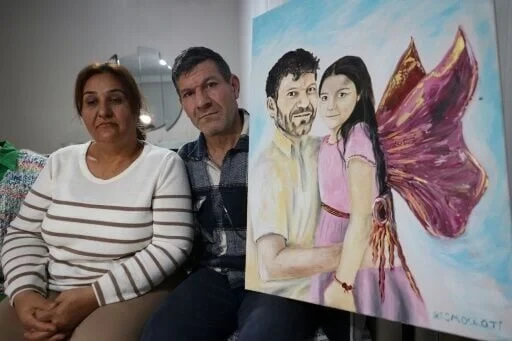'Time has stopped': grieving father relives Turkish quake

Stay tuned with 24 News HD Android App

The photo of Mesut Hancer holding his dead daughter's hand protruding from the debris, her body crushed and his gaze lost, epitomised the anguish of Turkey's devastating earthquake.
In the year since the February 6 disaster claimed more than 53,500 lives in Turkey and nearly 6,000 in Syria, the bereaved father and his family have left their partially ruined city of Kahramanmaras and are trying to rebuild their lives in Ankara.
They will return to the quake zone to commemorate the first anniversary and visit the grave of Irmak, who was killed in her sleep at the age of 15.
"A year has passed but time has stopped for us. This pain does not go away," Hancer said, sitting in a living room whose walls are covered with photographs and drawings of his daughter.
"I don't stop thinking about her for a minute," added her mother, Gulseren.
The day before the disaster, Irmak had gone to her grandmother's house to see her cousins, who had come over from Istanbul and Hatay.
She insisted on staying overnight, never imagining that nearly all the 22 high-rise buildings in her grandmother's Ebrar housing complex would topple like a house of cards, killing 1,400 people.
By the time Mesut and his son Berkay, 23, were able to reach the scene, only piles of rubble remained.
They had to wait until daybreak to start looking for Irmak, clearing the debris with their bare hands.
Mesut only spotted his daughter's lifeless body -- still lying on her mattress between two heavy slabs of concrete -- the next day.
"Seeing her like that hurt me so much," he said.
- 'Take photos of my child' -
Petrified with grief, he sat next to her in the ruins, holding her cold, pale, protruding hand.
Irmak was the youngest of his four children.
Mesut did not know how long he sat there before seeing AFP photographer Adem Altan pointing the camera his way.
"Take photos of my child," Mesut whispered to Altan.
The image struck a nerve.
It was picked up by world media, went viral online and was shared hundreds of thousands of times.
Moved by the story, Nejat Gulseven, an Ankara businessman who owns Turkey's TV 100 channel, offered accommodations and a job to Mesut, who worked as a baker in Kahramanmaras.
Since the disaster, Berkay has become a police officer, hoping to join one of the special search and rescue units that were deployed during the quake.
"We are trying to get used to Ankara," Mesut said.
"I also lost my mother, brother, sister-in-law and my nieces in the earthquake. But there is nothing like losing your child."
No hope for justice
The Ebrar housing complex was built on unstable ground, using poor quality material and concrete that could be crumbled into little pieces by hand, according to the conclusions of a report by legal experts.
Two of the contractors involved in the construction rejected charges of wilful negligence when they appeared in court for the first time earlier this year.
Mesut said he does not believe justice will ever be served.
"A year has passed and one of the developers is still on the run. They built it on a former river bed. Those who authorised the construction are also responsible," he said.
The family did not file a civil suit, thinking the effort would be in vain.
"It's not going to bring my daughter back," her mother Gulseren said.
The trials launched since the quake only target developers and contractors, sparing politicians and civil servants who authorised the building permits.
Instead, on February 6 the Hancer family will be at Irmak's grave, grieving.
"The cemetery where she rests is now my second home," Gulseren said. "I feel like she's waiting for me there."
